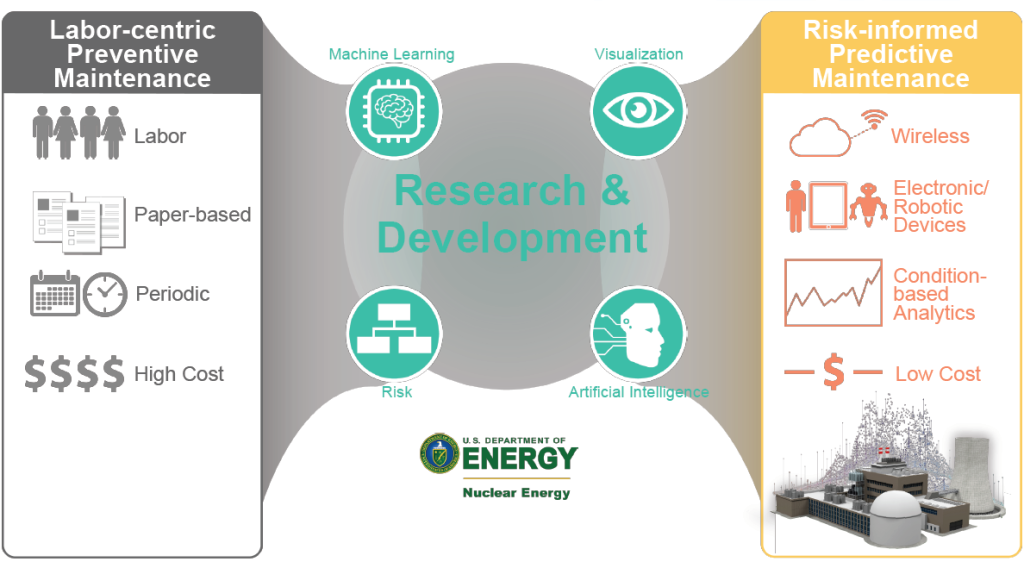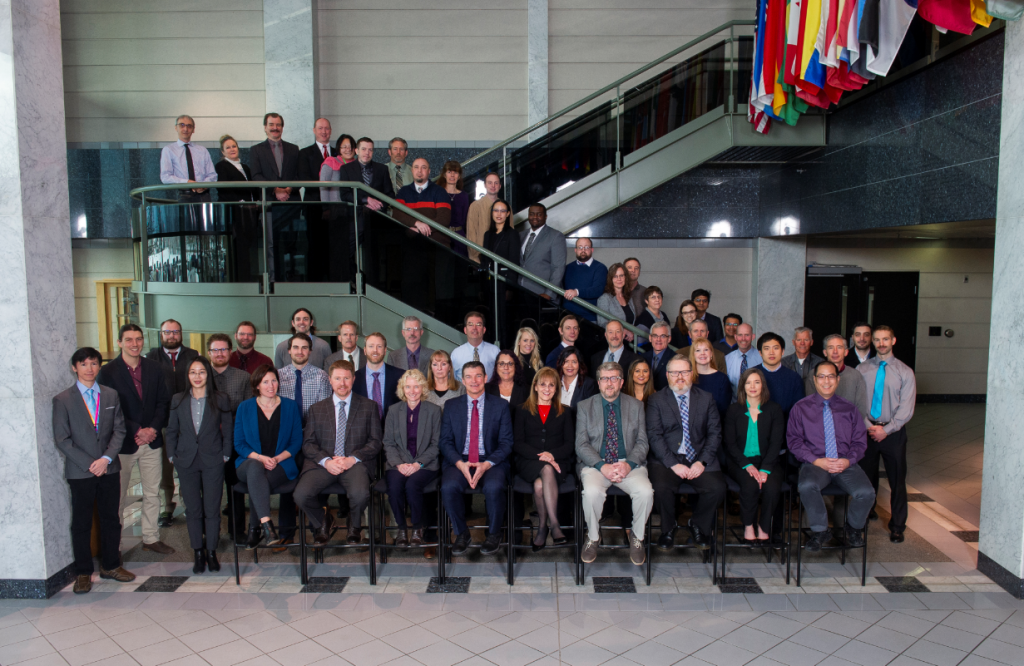Artificial Intelligence
and Machine Learning
Artificial intelligence (AI) and machine learning (ML) are helping INL scientists pursue advances in engineering and energy research. Computers that mimic cognitive functions and apply complex algorithms to analyze data can help researchers solve a variety of technical issues. This new approach aids in everything from materials design for advanced reactors to making nuclear power plant control rooms more usable and efficient.
Our vision is to use AI and ML to glean new research insights and enhance INL’s core research capabilities.
What is artificial intelligence and machine learning?
AI is a computer-based approaches to activities that normally require intelligence (translating data and information into knowledge) to perform effectively. ML is a form of artificial intelligence in which computer algorithms learn from data to form predictive models.
Supporting INL's research missions
INL’s vision is to change the world’s energy future and secure our nation’s critical infrastructure. To support INL’s research missions, we have five goals.
- Methods: Use AI/ML to bridge existing research gaps.
- Data: Use INL’s unique data sources and expertise to leverage AI/ML for new insights.
- Tools: Innovate an agile AI/ML computing infrastructure.
- People: Develop and mature researchers’ AI/ML capabilities.
- Security: Ensure trustworthy AI/ML that is explainable to end users and decision makers.
Artificial intelligence and machine learning support a variety of research areas and useful applications:
Nuclear Energy:
The increasing adoption of artificial intelligence will accelerate nuclear energy deployment in America. INL will help facilitate this transition by addressing the following challenges:
Autonomous design, development and licensing: INL aims to leverage AI and ML to streamline the design, development, and licensing processes for nuclear reactors. By integrating AI with engineering tools, we can automate the creation of 3D building information models and enhance the efficiency of the design workflow. This includes developing systems that interface with regulatory bodies to facilitate timely feedback on design documentation and simulations. This will reduce the time and resources required for licensing. INL is also focused on using AI to analyze historical project data, which can identify best practices and potential challenges, improving the design process and minimizing risks associated with delays and cost overruns.
Realization of autonomous operations: INL is committed to advancing autonomous operational capabilities for small modular reactors and microreactors. Through the development of advanced instrumentation, sensors, and AI algorithms, we are enabling remote and autonomous operations that enhance safety and efficiency. Our research includes creating digital twins that provide real-time data to continuously monitor reactor performance. By implementing AI-driven monitoring systems, we can detect anomalies and operational inefficiencies early, allowing for proactive maintenance.
Dominating nuclear energy research and development: INL is maximizing the use of its specialized test facilities. Operating nearly around the clock allows us to efficiently qualify new fuels and materials while accelerating the research timeline. INL is also focused on developing advanced computational models that simulate reactor behavior under various conditions, providing critical insights into fuel performance and reactor dynamics. By collaborating with industry partners and academic institutions, we seek to advance the development of innovative fuels and technologies that improve the safety and efficiency of the next generation of nuclear power plants.

National Security:
- Identify anomalous network traffic, alert operators and deploy virtual decoys to slow or halt hacking attempts. Autonomic Intelligent Cyber Sensor is an INL artificial intelligence breakthrough that can protect the nation’s critical infrastructure from devastating cyberattack. The sensor works autonomously to give industries the power to quickly identify and divert hackers, using machine learning to identify and map industrial control systems.
- Detecting malicious traffic on 4G/5G cellular networks
- Classifying radio frequency signals using artificial neural networks.
Emergency Response:
- Identify patterns in nonlinear data to understand the conditions that will result in future emergencies, such as earthquakes or electrical grid failures.
Transportation:
- Improving air traffic control efficiency and relieving traffic control on busy city streets.
INL AI/ML Symposiums
2024
INL AI/ML Symposium 13.0 – held March 28, 2024
The 13.0 Symposium focused on vision and visualization with AI/ML.
Presentation Slides
2023
INL AI/ML Symposium 12.0 – held Nov. 2, 2023
The 12.0 Symposium focused on Diversity, Equity and Inclusion in AI/ML.
Presentation Slides
INL AI/ML Symposium 11.0 – held April 27, 2023
The 11.0 Symposium focused on AI/ML in instrumentation, control, and automation.
Presentation Slides
INL AI/ML Symposium 10.0 – held Jan. 19, 2023
The 10.0 Symposium focused on AI/ML technology and some novel applications.
Presentation Slides
2022
INL AI/ML Symposium 9.0 – held Sept. 8, 2022
The 9.0 Symposium focused on natural language processing methods and applications.
Presentation Slides
INL AI/ML Symposium 8.0 – held May 26, 2022
The 8.0 symposium focused on computation infrastructure in artificial intelligence and machine learning.
Presentation Slides
INL AI/ML Symposium 7.0 – held February 10, 2022
The 7.0 Symposium focused on addressing data issues and using data for different science and engineering applications.
Presentation Slides
2021
INL AI/ML Symposium 6.0 – held Oct. 14, 2021
The 6.0 Symposium focused on resilience, both in resilience applications of AI/ML or in resilience in AI/ML approaches.
Presentation Slides
INL AI/ML Symposium 5.0 – held June 8, 2021
The 5.0 Symposium focused on trustworthy AI/ML.
Presentation Slides
INL AI/ML Symposium. 4.0 – held February 9, 2021
The 4.0 Symposium focused on trustworthy AI/ML.
Presentation Slides
2020
INL AI/ML Symposium 3.0 – held October 16, 2020
The 3.0 Symposium discussed how ML and AI are currently being applied in the industry, including opportunities for engagement and collaboration.
Presentation Slides
INL AI/ML Symposium 2.0 – held July 9, 2020
The 2.0 Symposium discussed how ML and AI are currently being applied in the industry, including opportunities for engagement and collaboration.
Presentation Slides
INL AI/ML Symposium 1.0 – held April 17, 2020
INL held the first symposium on AI/ML approaches and activities related to science and engineering in April. The “1.0 Symposium” focused on internal-to-INL activities and capabilities. A total of eleven speakers discussed a variety of current topics and future applications. Over 200 INL staff participated in the symposium.
Topics included:
- AI Overview
- Robotics
- Data Analysis
- Modeling Human Cognition
- ML in Current Projects
Presentation Slides
Programs working with AI
Digital Innovation Center of Excellence
The Digital Innovation Center of Excellence (DICE) at INL was created to support the development of advanced reactors through digital engineering. Developed in part to predict reactor performance for the Versatile Test Reactor, DICE is organized into eight key pillars:
- Next-Generation Artificial Intelligence
- Operational Artificial Intelligence
- Practice and Culture
- Digital Twin
- Digital Thread
- Decision Sciences and Visualization
- Cyber and Data Resilience
- Computing Platforms
For more information on DICE, click here.


Nuclear Safety and Regulatory Research Division
INL’s Nuclear Safety and Regulatory Research Division supports a wide variety of activities. In particular, it ensures the nation’s safe, competitive and tenable use of engineered systems in many domains by applying INL capabilities to impactful issues in risk, reliability and operational performance.
Our recent AI/ML projects include:
- Advanced Remote Monitoring for Operations Readiness
- Digital Architecture to Support an Automated Plant
- Automation of the Work Process
- Risk-Informed Predictive Maintenance Strategy
- Computerized Operator Support System
- Dynamic Human Reliability Analysis
To work with us on your AI/ML project or to find out more about these INL AI/ML activities, contact our subject matter experts:
Ashley Shields – Manager, Computational Data Science
Chris Ritter – Director, Digital Innovation Center of Excellence
Nancy Lybeck – Manager, Data Science & Applied Statistics
Ronald Boring – Human Factors & Reliability
